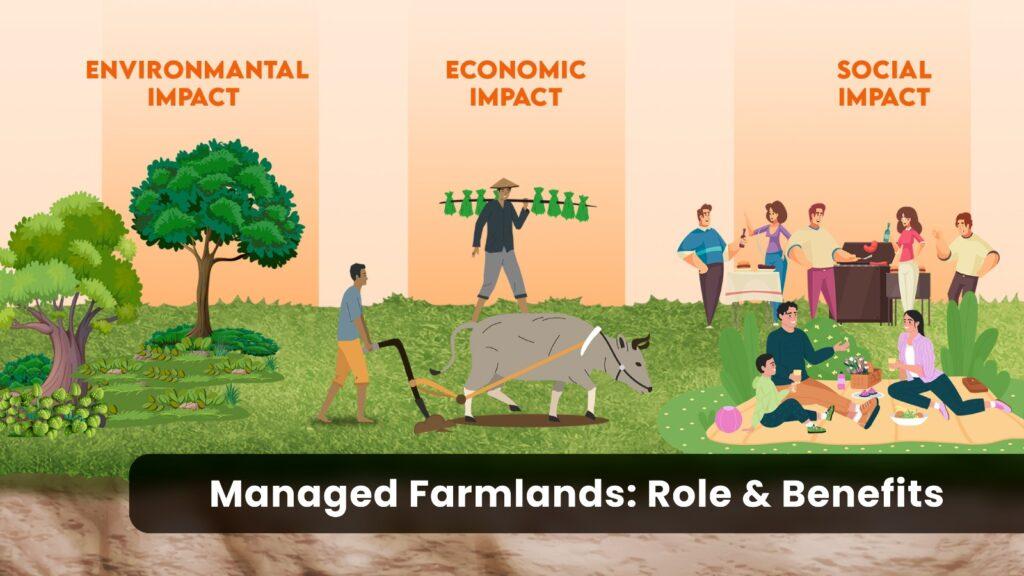Managed farmlands are an essential part of many communities, providing a range of benefits that go beyond just producing food. From supporting local economies to preserving natural habitats, these lands play a critical role in maintaining the health and well-being of both people and the environment. In this article, we’ll explore the many benefits of managed farmlands and why they are so important to our communities.
What Are Managed Farmlands?
Farmlands that are actively maintained and managed for the goal of generating food, fiber, and other agricultural products are referred to as managed farmlands. These properties are usually owned and managed by farmers or agricultural professionals who put a lot of effort into keeping their livestock and crops healthy and productive. However, properly run farms accomplish much more than merely grow food. They are a crucial component of our agricultural landscape because they assist local communities in a variety of ways, including economically, environmentally, and socially.
The contribution of managed farmlands to regional economies is one of their main advantages. These lands support allied industries like food processing and distribution while also offering employment to farmers, farm workers, and other agricultural professionals. Managed farmlands can also contribute to the preservation of rural towns and cultures, giving people who live and work there a feeling of place and identity. In terms of the environment, managed farmlands can support the preservation of soil, water, and wildlife habitat in addition to lowering greenhouse gas emissions by implementing sustainable farming techniques. In general, regulated farmlands are an essential part of our society’s food chain.
Economic Impact of Managed Farmlands
Local communities gain major economic advantages from managed farmlands. They help other local businesses by generating jobs in distribution, food processing, and agriculture. These areas can also bring in money by selling crops, cattle, and other agricultural goods. By reinvesting this income in the local economy, the community’s growth and development can be further aided. In general, well-managed farmlands are an essential part of a strong and vibrant neighborhood economy.
Managed farmlands offer numerous economic advantages besides only producing income and jobs. For instance, they might support the protection of natural resources and the preservation of open space, both of which can draw tourists and outdoor enthusiasts. Further economic prospects may result from this in the form of tourism-related enterprises including lodging, dining, and leisure pursuits. Furthermore, by offering a nearby source of fresh produce and other agricultural goods, maintained farmlands can contribute to lowering the price of food for local customers. Overall, managed farmlands offer a wide range of economic advantages, making them an important resource for any community.
Environmental Impact of Managed Farmlands
The ability of managed farmlands to protect biodiversity and preserve natural habitats is one of their most significant environmental advantages. These areas promote the health of our planet’s ecosystems and a vast variety of plant and animal species by acting as homes for them. Additionally, by encouraging healthy soil and limiting the use of toxic pesticides, managed farmlands can aid in lowering soil erosion and enhancing water quality. This is advantageous to both the environment and preserving the safety and quality of our food supply. Finally, by sequestering carbon and lowering greenhouse gas emissions, managed farmlands can contribute significantly to minimizing the effects of climate change. Farmers may lessen their carbon footprint and contribute to a healthier environment for future generations by using sustainable farming practices and using fewer fossil fuels.
Social Impact of Managed Farmlands
Local communities gain a variety of social advantages from managed farmlands. They frequently act as gathering spots for neighborhood events and festivals, such farmers markets. These gatherings foster a sense of community pride while also supporting nearby businesses and bringing people together. Managed farmlands can also offer chances for learning and entertainment, such agricultural tours and hiking paths. These activities not only improve physical health but also foster a sense of connection to the outdoors and an understanding of sustainable agricultural methods.
Managed farmlands can support food access and security in addition to offering gathering spots and leisure activities. These farms can help combat food deserts and offer wholesome options to low-income communities by producing fresh, locally farmed food. Additionally, they can aid regional food banks and other initiatives to combat hunger. Managed farmlands can also boost employment and economic development in rural areas, supporting local economies and maintaining cultural traditions. Overall, managed farmlands offer a wide range of social advantages, making them a valuable resource for any community.
Conclusion: The Importance Of Supporting Managed Farmlands
In summary, managed farmlands are an essential part of our communities since they bring about positive effects on the economy, the environment, and society. We can guarantee that these lands will continue to offer food, habitat, and other resources for future generations by taking care of them. It’s crucial to acknowledge the critical role that managed farmlands play in our lives, whether you’re a farmer, consumer, or simply someone who cares about the health of our world. In order to support these lands and the communities that depend on them, let’s work together.
We are Mogg’s Estates, a managed farmland company in Bangalore that directs all its efforts towards promoting a healthy environmental and economical balance in the society.
You are always welcome in the Mogg’s community if you are seeking an opportunity to give back to the environment and promote the well-being of communities nearby. Let’s work together to highlight the idea of managed farmlands so that we may create a positive effect on our surroundings.




